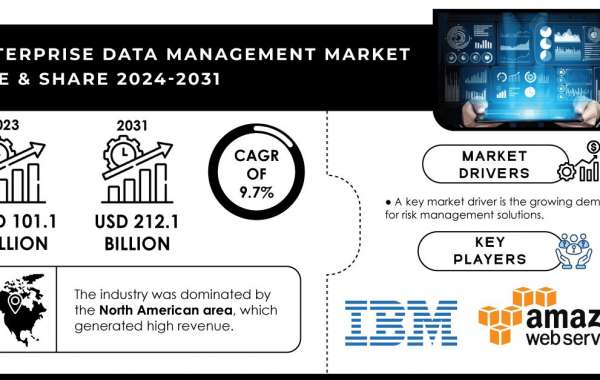Enterprise Data Management 2024
As businesses navigate the complexities of the modern digital landscape, data has emerged as a critical asset that drives innovation, efficiency, and competitive advantage. Enterprise Data Management (EDM) is the practice of organizing, storing, and analyzing data to ensure it is accurate, secure, and readily available for decision-making. Effective EDM not only helps organizations manage their data assets but also enables them to harness the power of data for strategic business growth.
Enterprise Data Management Market size was valued at USD 101.1 billion in 2023 and is expected to grow to USD 212.1 billion by 2031 and grow at a CAGR of 9.7% over the forecast period of 2024-2031.
Some of the major players in this market are International Business Machines Corp, Micro Focus, Oracle Corp, Broadcom, SAP SE, Cloudera Inc, Talend, Amazon Web Services, Teradata, Informatica, MindTree Ltd, and others.
The Strategic Importance of EDM
In the digital age, data is a key driver of business success. Organizations that can effectively manage and leverage their data assets are better positioned to innovate, optimize operations, and deliver superior customer experiences. EDM plays a strategic role in this process by ensuring that data is accurate, accessible, and secure.
One of the key benefits of EDM is its ability to improve decision-making. By providing a unified and accurate view of data, EDM enables organizations to make informed decisions based on real-time insights. This not only enhances operational efficiency but also drives business growth by enabling organizations to respond quickly to market changes and customer needs.
Additionally, EDM supports regulatory compliance by ensuring that data is managed in accordance with legal and industry standards. This is particularly important in industries such as finance, healthcare, and telecommunications, where data privacy and security are critical concerns.
Key Components of a Strategic EDM Framework
A strategic EDM framework involves several key components, each of which plays a critical role in managing the organization’s data:
Data Governance: Establishes the policies, procedures, and standards for managing data across the organization. Data governance ensures that data is managed consistently and responsibly, supporting both operational and strategic objectives.
Data Integration: Combines data from different sources to provide a unified view, enabling accurate reporting and analytics. Data integration is essential for gaining a comprehensive understanding of the organization’s data assets.
Data Quality Management: Ensures that data is accurate, complete, and reliable, supporting effective decision-making. Poor data quality can undermine the effectiveness of EDM, leading to flawed insights and decisions.
Master Data Management (MDM): Manages the organization’s critical data entities, such as customers, products, and suppliers, to ensure consistency and accuracy across all systems. MDM is essential for maintaining data integrity and supporting data-driven decision-making.
Data Security: Protects data from unauthorized access, breaches, and other cyber threats. Data security is a top priority for organizations, particularly in the face of increasing cyber threats and regulatory requirements.
Data Analytics: Leverages data to generate insights that drive business decisions. Data analytics is a key component of a strategic EDM framework, enabling organizations to extract value from their data and gain a competitive edge.
Challenges and Opportunities in EDM
While EDM offers significant benefits, it also presents several challenges that organizations must address to maximize its effectiveness. One of the primary challenges is data integration, particularly in large organizations with complex IT environments. Data is often stored in different systems, formats, and locations, making it difficult to integrate and analyze. This can lead to data silos, where data is isolated and inaccessible, hindering effective decision-making.
Another challenge is ensuring data quality. Inaccurate or incomplete data can lead to faulty insights and poor decision-making, undermining the effectiveness of EDM. Organizations must invest in tools and processes that continuously monitor and improve data quality.
Data security is also a major concern, particularly in industries where data privacy is a critical issue. Organizations must implement robust security measures to protect their data from breaches and unauthorized access. This includes encrypting sensitive data, implementing access controls, and regularly auditing security practices.
Despite these challenges, EDM also presents significant opportunities for organizations. By effectively managing their data assets, organizations can gain a competitive edge, drive innovation, and achieve strategic business objectives. Moreover, emerging technologies such as artificial intelligence, machine learning, and blockchain offer new opportunities for enhancing EDM, enabling organizations to manage their data more efficiently and securely.
Best Practices for Strategic EDM Implementation
To overcome the challenges of EDM and maximize its benefits, organizations should follow these best practices:
Develop a Comprehensive Data Governance Framework: A strong data governance framework is essential for ensuring that data is managed consistently and responsibly across the organization. This involves establishing clear policies, defining roles and responsibilities, and ensuring compliance with regulatory requirements.
Invest in Data Quality Management: Data quality is critical for effective decision-making. Organizations should invest in tools and processes that monitor and improve data quality, ensuring that data is accurate, complete, and reliable.
Implement a Robust Data Integration Strategy: Data integration is essential for providing a unified view of the organization’s data. Organizations should implement a data integration strategy that combines data from different sources and formats, ensuring that it is accessible and usable.
Prioritize Data Security: Protecting data from breaches and unauthorized access is a top priority. Organizations should implement strong data security measures, such as encryption, access controls, and regular security audits, to protect their data assets.
Leverage Advanced Analytics: Data analytics is key to unlocking the value of data. Organizations should invest in analytics tools and techniques that can analyze data and generate actionable insights.
Foster a Data-Driven Culture: A data-driven culture is essential for effective EDM. Organizations should encourage the use of data in decision-making at all levels and provide training and support to employees on data management best practices.
Conclusion
Enterprise Data Management is a critical component of modern business strategy, enabling organizations to effectively manage their data assets, drive business growth, and stay competitive in the digital era. By following best practices and leveraging emerging technologies, organizations can overcome the challenges of EDM and unlock the full potential of their data.
Contact Us:
Akash Anand – Head of Business Development & Strategy
info@snsinsider.com
Phone: +1-415-230-0044 (US) | +91-7798602273 (IND)
About Us
SNS Insider is one of the leading market research and consulting agencies that dominates the market research industry globally. Our company's aim is to give clients the knowledge they require in order to function in changing circumstances. In order to give you current, accurate market data, consumer insights, and opinions so that you can make decisions with confidence, we employ a variety of techniques, including surveys, video talks, and focus groups around the world.
Read Our Other Reports:
Applicant Tracking System Market Forecast




